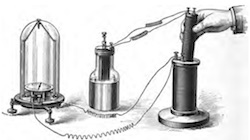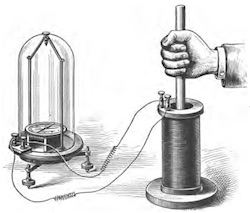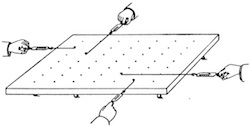
John D. Norton
Department of History and Philosophy of Science
University of Pittsburgh
Published in Filozofuj! 2019, No.3, pp. 16-18. In Polish. Read.

Our sciences assure us that changes in the world are governed by reliable and repeatable regularities. Free objects fall; heat passes from hot to cold; and light propagates very fast in straight lines. All this is the subject of the sciences: theories of gravity, thermodynamics and optics. The totality of these facts captures the sense in which things in our world connect in an orderly way.
Metaphysicians tell us, however, that they have discovered a deeper truth about how things connect. It is that the world is causal at some more fundamental level. It is expressed, they say, in one of the most general facts of world, the principle of causality. This fact comes prior to any science. All possible sciences must defer to it; and their burden is merely to find the particular expression of this principle in their subject matter.
It would be wonderful to have such a principle. The difficulty, however, is that metaphysicians have been unable to state a principle of causality that correctly and robustly places factual restrictions on processes in the world. Attempts to formulate these prior restrictions provide an enduring history of failure.

Aristotle specified that all processes have final causes. They are that for the sake of which the process occurs. Water flows down the mountainside in order to realize it proper place in valley. Fire rises to realize its place in the outer terrestrial sphere. The mechanical philosophers of the seventeeth century objected. All these processes are driven solely mechanically by agents acting now in physical contact with the process. Processes have no purpose. There are no final causes.
It is easy once one correction has been made to become convinced that it is the final correction, true for all time. Even Newton, one of my greatest scientific heroes, fell into the trap. When the gravity of the earth pulls on the moon, is the earth here exerting its force on the distant moon without anything in between carrying the action, contrary to the mechanical philosophy? Newton denounced the idea as preposterous:
[T]hat one body may act upon another at a distance through a vacuum, without the mediation of anything else, by and through which their action and force may be conveyed from one to another, is to me so great an absurdity, that I believe no man, who has in philosophical matters a competent faculty of thinking, can ever fall into it.
Yet the notion of Newtonian gravity as an unmediated
action at a distance became a standard view.
By the nineteenth century, the notion of causation was purged of all its ornamentations. It was reduced to one simple idea: the present state of affairs fixes the future. Nothing more. To be causally well-behaved is to be deterministic. Here is John Stuart Mill’s statement in his nineteenth century tome, A System of Logic:
The Law of Causation … is but the familiar truth,
that invariability of succession is found by observation to obtain between
every fact in nature and some other fact which has preceded it;
independently of all considerations respecting the ultimate mode of
production of phenomena, and of every other question regarding the nature
of “Things in themselves.”
The philosophical appeal of this purged notion lay in it purity and simplicity. That was also its undoing. In the early 1920s, fundamental physics was overtaken by the new quantum theory. According to it, the present no longer determines the future. The best quantum theory can offer are probabilities for different futures. Philosophers reacted with shock. The causal order of the world was lost.
Friedrich Waismann later described the loss in ominous terms in a 1958 lecture “The Decline and Fall of Causality.” “…causality has definitely come to an end,” he said, “atomic science has penetrated to a depth where an entirely new orientation is called for.”
The tumult and turmoil soon passed. All that was really lost was a defective notion of causation. It was easy enough to replace this notion with another one. Contrary to the nineteenth century philosophers, it was now decreed, causes do not determine their effects. Causes merely raise the probabilities of their effects. Hans Reichenbach introduced a new principle of the common cause: probabilistically correlated outcomes must have a common cause responsible for the correlations. Yet even this principle was felled by the pathologies of curious quantum states, the so-called entangled states.
This probabilistic view remains a common view. However it too is fragile. Once one is alerted to look, quite prosaic physical theories can offer systems in which the present state does not fix future states and even fails to give probabilities for the different possibilities.

What are we to make of this history failure? Is it analogous to the sorts of revolutions we have seen repeatedly in science? Newton’s celebrated mechanics was replaced by Einstein’s relativity. The waves and particles of the nineteenth century were replaced by the wave-particles of twentieth century quantum theory. And so on. These failures are part of the self-correction of science. Each new theory incorporates the old science and improves on it.
The failure of metaphysics is unlike this, for scientific revolutions come from within the science. They spring from the scientists’ observations and experiments. Causal metaphysics has no independent means of engendering novel conceptions. Changes are imposed on it by changes in the science and are often accepted begrudgingly by an unwilling metaphysics. Causal metaphysics simply follows and mimics the science while pretending to lead.
How then are we to think of the elaborate pronouncements of the causal metaphysicians? In so far as these pronouncements are trying to restrict the factual possibilities of all sciences, they are an attempt at doing science prior to experience of the relevant parts of the world. Their failure is assured, for nature has proven itself again and again adept at outstripping our boldest imaginings.
If these pronouncements are not restricting factual possibilities, then what are they are doing? In my view, all they do is attach labels. We see a body fall under gravity. We say gravity causes it to fall. We see that a magnetic force accelerates iron filings towards a magnet. We say that the magnet causes the iron filings to move. We see that sea air corrodes an iron rail. We say that the sea air causes the corrosion.
These causal labels add nothing factual to the original scientific claim. They are just the attaching of names. Yet the causal labels are not valueless. They give us comfort with the process that otherwise be mysterious.
How can the invisible salty air corrode the iron? It is like the mouse who comes invisibly at night to gnaw on the cheese. How can the earth attract the moon and the magnet the iron, without mediation of anything in between? It is like a dog attracted to his supper bowl; or fans attracted to a celebrity. The unfamiliar becomes familiar.
There is a practical advantage. We find that increased fluoride levels in drinking water is associated with better dental health. We label fluoride as a cause of dental health. We now group this process with other cases of useful knowledge in which manipulations are associated with outcomes we desire. We gain control of the world by seeking causes in this sense. The metaphysical conceptions give us no new factual knowledge of the world. We redescribe the search for useful manipulations as the search for causes.
The analysis of causation does not yield profound truths of the world antecedent to our sciences. Rather it gives us a way to work conveniently with what we already know or may come to know through the routine investigations of science.
Images from H. C. Cheston et al.,
A Laboratory Manual of Physics, New York: American Book Co.,
1903.
March 1, 2019.